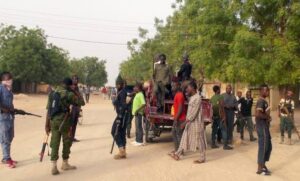
Nigeria Mourns as 183 Killed in Third Week of April Alone—Nation Outraged Over Rising Insecurity

Nigeria is once again plunged into national mourning following a surge in violent attacks that claimed the lives of at least 183 people in just the third week of April. This tragic toll is the latest in a growing pattern of insecurity that has gripped Africa’s most populous nation, leaving citizens outraged and demanding accountability from the federal government.
Northeast Bleeds Again: Jihadist Groups Regroup
The northeastern region—particularly Borno and Adamawa states—has seen a sharp increase in attacks linked to Boko Haram and its offshoot, the Islamic State West Africa Province (ISWAP). These insurgents have employed increasingly sophisticated tactics, including the use of armed drones and improvised explosive devices.
Borno State Governor Babagana Zulum recently raised alarm over renewed militant activity in the Lake Chad and Sambisa Forest regions. Despite claims of weakened insurgents, locals are reporting abductions, ambushes, and fatal raids with alarming frequency.
Middle Belt in Crisis: Ethno-Religious Tensions Flare
In central Nigeria, especially in Plateau and Benue states, the decades-long conflict between nomadic herders and farming communities has taken a deadly turn. More than 150 deaths have been recorded this month alone, with homes razed and entire communities displaced. Analysts say environmental degradation and the proliferation of firearms have worsened the situation, turning disputes over land into massacres.
President Bola Tinubu’s absence during this period—reportedly on a prolonged European trip—has drawn harsh criticism from political opponents and the public alike. Critics accuse the administration of downplaying the scale of the crisis and failing to provide urgent relief or policy reform.
Nationwide Security Breakdown
The violence is not confined to the North and Middle Belt. States like Kogi, Osun, Imo, Kwara, and Niger have also witnessed deadly incidents. According to data from the National Bureau of Statistics, over 805 people have been killed across Nigeria in just the first six weeks of 2025. This follows an even grimmer report from 2024, which recorded over 600,000 deaths from insecurity-related incidents.
These figures underscore the depth of Nigeria’s multi-dimensional security challenges—ranging from terrorism and banditry to communal clashes and political violence.
Government Response Under Fire
In response, President Tinubu has directed security forces to eliminate all threats by the end of 2025 and pledged increased funding and intelligence sharing. Yet, many view the response as reactive rather than preventive. Structural issues—such as inadequate troop numbers, low morale, and corruption—continue to paralyze efforts on the ground.
Community leaders and civil society organizations are calling for deeper reforms, improved local governance, and better integration of non-military strategies to address the roots of these conflicts.
A Nation in Grief—and in Protest
Protests have erupted in major cities, with demonstrators holding vigils for victims and demanding justice. Social media campaigns under hashtags like SecureNigeriaNow and StopTheKillings have drawn global attention to the crisis.
As Nigerians bury yet another round of victims, the pressure mounts on the federal government to deliver more than promises. Without decisive action, many fear that the country’s fragile unity and social fabric could deteriorate even further.
We can’t keep counting corpses while the government makes speeches,”** said Amina Yusuf, a civil society advocate in Abuja. **“Nigeria deserves peace, not perpetual mourning.





